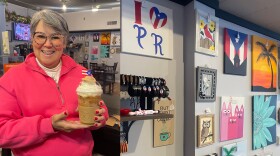It's the start of another school year. Scrub-faced children all over Milwaukee have said goodbye to summer fun and hello to another year of learning and making new friends.
Even though adults may look back on their formative years with a saccharin-sweet fondness, members of the current elementary school generation may be struggling to fit in. And that's especially true for children with disabilities.
Milwaukee clothing designer Florence Eiseman's motto was, "children should look like children. You should see the child first and not the clothing." She teamed up with noted designer Helen Cookman to create Functional Fashions, a line of adaptive clothing for children designed to allow the child dress themselves and ease the work of the caregivers.
These works, and others, are currently on display in the Florence Eiseman: Designing Childhood for the American Century exhibit at the Museum of Wisconsin Art in West Bend. In that collection is a garment from the Functional Fashions line and it's a rare find. Natalie Wright, a curatorial fellow at the Chipstone Foundation, discusses with Gianofer Fields one particular garment and rare find from the Functional Fashions line.

"She's wearing a shirt, or what's being called here as a smock, that has one single tie at the back of her neck so it would have been easy for the child to put on or take off," describes Wright. "But most importantly, the trousers that she's wearing have a drop seat. That would have assisted the child with bathroom activities, and the trousers are designed to have slightly wider legs in order to fit leg braces as well."
"The whole functional fashions line...were part of this effort to try and stop or diminish the rates of institutionalization," she explains. "They were trying to give children the opportunity to learn how to dress themselves. The thought was that this was the first step to a life of independence for children."
Material culture contributor Gianofer Fields curates the Radio Chipstone series. The project is funded by the Chipstone Foundation, a decorative arts foundation whose mission is preserving and interpreting their collection, as well as stimulating research and education in the decorative arts.





